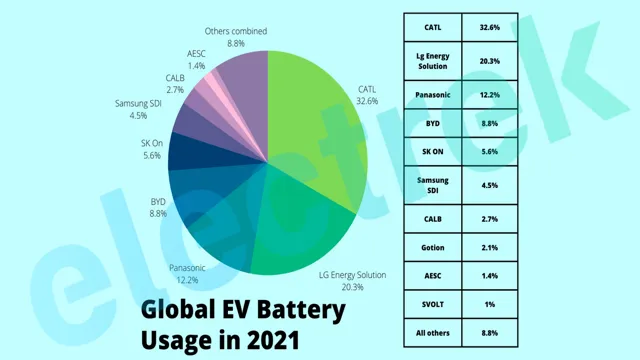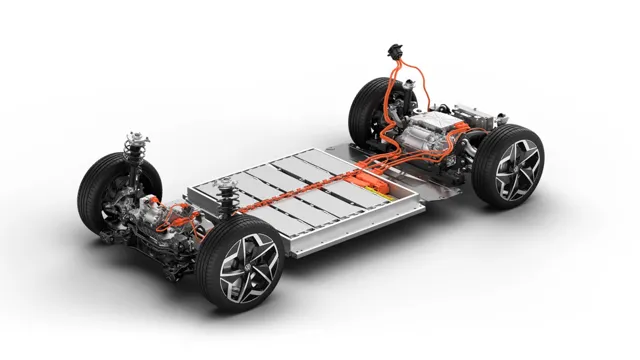Shocking Truth About Battery Costs for Electric Cars: How Much You Really Pay for a Greener Ride
When it comes to electric cars, battery costs are a major factor to consider. They are the heart and soul of the vehicle, storing the energy needed to power it. As demand for electric vehicles grows, the cost of batteries has been decreasing steadily over the years.
In the past decade, they have decreased by more than 85%, making them more affordable for customers. However, there are still concerns about the cost of replacing the battery and its impact on the overall cost of owning an electric car. In this blog, we will dive into the world of electric car battery costs, exploring what affects the prices and how they compare to the cost of other car components.
Join us on a journey through the fascinating world of electric car batteries and all their intricacies. Let’s dive in!
Current Cost of Electric Car Batteries
Battery costs for electric cars have seen significant declines in recent years. The US Department of Energy reports that the cost of electric vehicle batteries has fallen by more than 80% since 20 In 2020, the average cost of an electric vehicle battery pack was around $137 per kWh, down from over $1,000 per kWh in 20
This cost reduction is thanks to advancements in battery technology, increased demand for electric vehicles, and economies of scale in manufacturing. Lower battery costs have helped to make electric cars more affordable for the average consumer, and with further cost reductions expected in the coming years, electric cars are set to become even more accessible. While battery costs remain a significant portion of the overall cost of an electric vehicle, continued improvements in technology are expected to lead to further declines in the future, making electric cars an increasingly viable and attractive option for drivers looking to switch to a more sustainable mode of transportation.
Global Average Battery Cost per kWh
Electric car batteries have come a long way in recent years, both in terms of performance and cost. Today, the global average battery cost per kWh is estimated to be around $13 This is a significant drop from just a few years ago when electric car batteries were much more expensive.
The lower cost of batteries is one of the key reasons why electric cars are becoming more popular. With a lower cost per kWh, electric car manufacturers are able to offer more affordable vehicles. Additionally, advancements in battery technology have led to longer battery life and increased range.
As a result, electric cars are now a more viable option for many people who were previously skeptical about the technology. While the cost of electric car batteries is still higher than the cost of traditional gasoline-powered engines, it is expected to continue to drop in the coming years, making electric cars even more affordable and accessible for consumers.
Cost Variation Based on Battery Size and Manufacturer
The cost of electric car batteries varies based on the size and manufacturer. Currently, the average cost of a battery for an electric car is around $10,000 to $15,000. However, the cost can range from as low as $6,000 to as high as $20,000 depending on the size and type of battery used.
For example, a larger battery with a higher capacity will generally cost more than a smaller one. In addition, the manufacturer also plays an important role in determining the cost of the battery. Some of the top electric car battery manufacturers include Tesla, LG Chem, and Panasonic.
Each of these manufacturers has its own pricing strategy and can offer different features and benefits. Thus, it’s important to do your research and consider the battery size as well as the manufacturer before making a purchase.
Factors Affecting Electric Car Battery Costs
Battery costs for electric cars are a significant factor in the price of an electric vehicle. As you might imagine, batteries represent the most expensive component in an electric car. There are several factors that contribute to the cost of batteries, including the materials used, the size of the battery, and the manufacturing process.
The most commonly used battery material for electric cars is lithium-ion due to its high energy density and long lifespan. However, other materials like nickel, cobalt, and manganese can also be used to create batteries with different performance characteristics. Larger batteries tend to cost more than smaller batteries due to the higher cost of materials and manufacturing complexity.
Manufacturing costs can also vary depending on the production process used, with more automated and efficient production processes typically leading to lower costs. As advancements in technology continue to drive down battery costs, we can expect to see more affordable electric vehicle options in the future.
Raw Material Costs for Batteries
Raw material costs for batteries in electric cars can be affected by various factors, such as supply and demand, mining and extraction costs, and government policies. For example, lithium, cobalt, and nickel are essential raw materials used in the production of batteries, and their prices are influenced by the availability of mining sources and extraction methods. Electronic waste disposal policies and recycling technologies also play a crucial role in the price of raw materials and the cost of batteries, as recycling can help to reduce mining and extraction costs.
Moreover, the popularity of electric vehicles can also impact the price of raw materials and batteries due to increased demand and competition among car manufacturers. As the demand for electric vehicles continues to grow, it is essential to find sustainable and environmentally friendly ways to produce and recycle batteries. By doing so, the cost of raw materials can be reduced, making electric cars a more accessible and affordable option for everyone.
Research and Development Expenses
Electric car batteries are a crucial component in electric vehicles, and their costs have a significant impact on the pricing of electric vehicles. Research and development (R&D) expenses are a crucial factor affecting electric car battery costs. Electric car battery technology is continually improving, making electric vehicles more efficient and practical.
However, this technology comes at a high cost as R&D expenses are extensive. These costs cover not only the technology itself but also the testing and development phases, which are very time-consuming. As the technology advances, the R&D expenses continue to increase, making electric car battery costs higher.
Additionally, electric car battery costs are also affected by the supply and demand of raw materials needed for production. These raw materials are expensive, and their costs can fluctuate depending on the global market. Therefore, electric car battery costs are significantly affected by a combination of R&D expenses and raw material availability and prices.
Electric car manufacturers must balance these expenses to make electric vehicles more affordable for the mainstream market.
Economies of Scale in Battery Manufacturing
Electric Car Battery Costs Economies of scale play a significant role in the cost of battery manufacturing in the electric car industry. The more batteries a manufacturer produces, the lower the cost of production per battery. This is because a more extensive production run allows for greater efficiency and optimization of the manufacturing process, leading to lower labor and material costs.
Factors that affect the cost of electric car batteries include battery chemistry, manufacturing processes, and the raw materials used to construct the batteries. These materials include cobalt, nickel, and lithium, which are essential for battery production. The costs of these materials can vary widely, affecting the overall cost of battery production.
Improvements in battery technology and increased competition in the industry are helping to drive down costs. As battery production becomes more efficient, the cost of electric car batteries will continue to decrease, making electric vehicles an increasingly competitive option for consumers looking for a sustainable and cost-effective mode of transportation.
Trends in Electric Car Battery Costs
One of the major concerns about electric vehicles (EVs) is the cost of their batteries. Although battery costs have decreased exponentially in the last decade, they still account for a significant portion of an EV’s price. However, the good news is that battery costs for EVs are continuing to decrease.
According to a report by Bloomberg New Energy Finance, the average cost of a lithium-ion battery pack fell by 87% over the last decade, from $1,100/kWh in 2010 to an estimated $137/kWh in 2020. Additionally, it’s predicted that battery costs will continue to decrease, reaching $100/kWh by 2023, and even $58/kWh by 2030. This reduction in battery costs makes EVs more affordable and accessible to a wider range of consumers.
As a result, it’s anticipated that the demand for EVs will increase significantly in the coming years.
Predicted Reductions in Battery Costs in the Next 5 Years
Electric car battery costs have been decreasing over the last decade, and experts predict that this trend will continue for at least the next five years. In fact, some analysts predict that electric car battery costs could decrease by as much as 70% by 2030. This reduction in battery costs is largely due to advancements in technology and improvements in the production process.
Additionally, increased competition in the industry has also contributed to driving down costs. With cheaper battery costs, electric cars will become more affordable for consumers and could ultimately replace traditional gas-powered vehicles. This shift would lead to a reduction in greenhouse gas emissions and an improved overall carbon footprint.
As a result, investing in electric vehicles and the technology behind them has become a key priority for many automobile manufacturers, and consumers are expected to see more affordable and efficient options in the near future.
Impact of EV Adoption on Battery Costs
As electric vehicles (EVs) become more prevalent in our society, the cost of batteries, which are a critical component of EVs, is rapidly changing. The trends in EV battery costs are generally positive. In the last decade, the average cost of lithium-ion batteries has dropped by over 80%.
This impressive reduction is largely due to technological advancements and economies of scale. As more automakers produce EVs, the demand for these batteries has increased, and as a result, their cost has decreased. Furthermore, the adoption of renewable energy sources and advancements in battery storage technology is expected to further accelerate the reduction in EV battery costs in the coming years.
However, despite these trends, EV battery costs will likely vary depending on the manufacturer, geographical location, and battery size. Nonetheless, as EV adoption continues to rise, the cost of batteries will decrease, ultimately making EVs more accessible to the masses.
Conclusion: Is an Electric Car Worth the Expense?
In conclusion, the cost of batteries for electric cars may be high in the present, but with advancements in technology and increased production, the prices are steadily decreasing. Like any new innovation, there are doubts and uncertainties, but as the world moves towards sustainability and reducing carbon emissions, electric cars will become the norm. So, let us strap on our seatbelts and embrace the future, where the only thing that runs out of juice is the battery, not the wallet.
“
FAQs
How much does it cost to replace the battery of an electric car?
The cost of replacing the battery of an electric car can vary depending on the make and model of the vehicle. On average, it can cost anywhere from $5,500 to $15,000.
How long does an electric car battery last before needing to be replaced?
The lifespan of an electric car battery typically ranges from 8 to 10 years before needing to be replaced. However, factors such as driving habits and environmental conditions can affect battery life.
Can the battery in an electric car be recharged using a regular electrical outlet?
Yes, most electric cars can be charged using a standard electrical outlet. However, it may take significantly longer compared to using a dedicated charging station.
How much does it cost to install a home charging station for an electric car?
The cost to install a home charging station for an electric car can vary depending on factors such as the type of charger and any necessary electrical upgrades. On average, installation can cost anywhere from $500 to $2,500.





